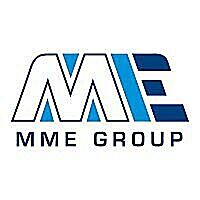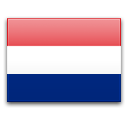MME GROUP

MME GROUP Mankind creates increasingly large objects. Our society can no longer do without bridges, ships, drilling rigs, refineries and other complex structures. Without due attention to quality and safety, these objects can pose a threat to people and to the environment. Ascertaining material integrity and protection against corrosion are therefore vitally important. MME Group is your partner in achieving this. MME Group is a family owned business that was founded in The Netherlands 60 years ago. Since then, it has expanded to become a globally operating and well respected leader in its fields of activity. These include (Non) Destructive Testing, Marine Surveys, Cathodic Protection, Marine Growth prevention, Rope Access, Aluminium Boarding Equipment and Playground and Recreational Safety services. These products and services help manufacturers, owners and operators safeguard the integrity and profitability of assets and products for the entire lifecycle. In doing so, we contribute to "A Longer Life" for the assets and those involved with them.
Products
The standard method for corrosion prevention
How sacrificial anodes work
Marine structures are predominantly made of steel. This makes them highly susceptible to corrosion. Seawater acts as an electrolyte, which causes a transfer of electrons from the steel structure through oxidation. If not dealt with, this process of gradual material reduction can degrade the structural integrity to the point of failure.
Besides coating, the standard protection method is the use of sacrificial anodes. These are made of a more active or less noble metal (usually zinc or aluminium). The sacrificial anodes are attached to the steel structure and since they oxidize more easily, they turn the structure itself into a cathode. The electrons leave the structure through the anodes which slowly dissolve. Applying this physics principle protects the steel structure against corrosion.
MME Group has decades of experience in applying sacrificial anodes to protect the following types of steel structures:
- All seagoing vessels (hull, ballast tanks, seachests, thruster tunnels, rudders)
- Offshore platforms
- Offshore wind turbine foundations
- Offshore pipelines
- Wet infrastructure (docks, piers, locks, quay walls, jetties)
- All zinc and aluminium anodes in our product range are produced in our fully owned ISO 9001 certified foundry located in Faversham (UK). With a distribution centre in the Rotterdam (The
- Netherlands) area, we can supply a large range of anodes from stock to almost any location in
- Europe in a matter of days.
Advanced systems for guaranteed protection
The application of sacrificial anodes is a passive protection method that doesn't accommodate for changed circumstances such as coating damage. Their volume is also calculated for a specific lifetime, after which they need to be replaced.
Impressed Current Cathodic Protection (ICCP) systems consist of one or more reference electrodes and several ICCP anodes which are all connected to a power unit. The reference cells measure the underwater electrical protection potential and based on this data, the power unit regulates the required output to the anodes. The resulting impressed current prevents the corrosion process from taking place. These advanced systems allow for real-time monitoring and guarantee the required protection level at all times. A correctly installed, operated and serviced ICCP system can function for 25 years or more. We can configure ICCP systems from standard components or work out a custom-built solution for specific vessels or structures.
Ships and other floating structures
Sacrificial anodes have been used to protect ship hulls for more than a century. However, they have some serious drawbacks when applied on larger vessels. Sacrificial anodes need to be replaced during each docking (usually every 3 or 5 years). Attaching anodes to the hull means influencing the vessel's hydrodynamics profile which leads to increased fuel cost. For large vessels, ICCP systems are a more cost efficient corrosion prevention method. The output is determined by the system’s reference cell measurements, which guarantees sufficient protection levels at all times.
Fixed structures
Fixed structures such as harbour quay walls, jetties, locks, offshore oil and gas rigs and Offshore Wind Farms can be protected with sacrificial anodes or ICCP systems. Sacrificial anodes are maintenance free, but if the asset’s lifetime is to be extended beyond the anodes’ calculated lifespan, other protection solutions are required. ICCP systems not only guarantee a sufficient level of protection, but also allow for real-time monitoring of the underwater electric potential and the system's output.
Free Log Sheet Service and No Subscription Fees!
Fed up with paying code renewal fees? Our systems have no subscription fees whatsoever. We offer replacement of subscription based systems at very sharp rates. Furthermore, all vessels that have MME Group ICCP and/or ICAF (MGPS) systems are eligible for our free Log Sheet Service. The vessel's chief engineer can fill out the daily system parameters in our digital log sheet (download below). These should be sent to our Cathodic Protection and MGPS division every month for analysis of the data. This free service allows you to detect any deviations before they can cause serious problems.
Preventing premature failure of drive train parts
Currents generated by ICCP systems and sacrificial anodes can enter the propeller shaft through the propeller. If left undrained, this can cause stray currents that might cause corrosion in the propeller shaft bearings or gearboxes.
Our shaft grounding (shaft earthing) systems drain any current sent out by the anodes. This prevents corrosion and premature failure of vital parts of the propulsion train. Generally speaking, every propeller shaft on a ship should be fitted with a grounding system.
The system consists of a set of silver brushes sliding over a copper slip ring with a silver strip. The silver brushes are pressed on the silver strip, ensuring maximum contact with the least resistance and thus allowing for optimal drainage of the current. The brush holders are mounted around the shaft utilising spindles, of which we have two types:
Electrically isolated: Brush and brush holder are connected to a power unit to monitor the shaft grounding system’s performance
Non-isolated: A bare metal spindle is used for draining the current to the hull
Real-time insight in your asset protection
In most branches of industry, Condition Based Maintenance (CBM) is becoming the standard. Real-time monitoring of corrosion parameters plays a crucial role in this. MME Group ICCP systems allow for real-time assessment of protection levels and other important data points.
Web-based remote monitoring for fixed assets
For fixed assets such as harbour quay walls, offshore wind farms and offshore rigs, we offer the option of a customized web-based ICCP monitoring portal. This gives asset managers insight in the protection levels of each individual asset. As a result, you are able minimize maintenance cost and maximize performance and ROI.
Our new ICCP & ICAF user interface
We are continuously improving our systems. MME Group has created a new way of operating, monitoring and maintaining these protective systems.
Your partner in development of innovative protection solutions
Being at the forefront of maritime and offshore industries means having a permanent focus on innovation. For many applications and vessel types, our systems can be assembled from standard components. In case of unique challenges and specific demands, our engineering department can be your partner in developing custom cathodic protection solutions.
Our In-house R&D competences include:
- Corrosion Consultancy
- FEM Analysis (Cathodic Protection & Mechanical)
- Chemical Engineering
- Performance monitoring after commissioning
Efficiently running cooling and ancillary systems
Open cooling systems have, as the name implies, an open connection to outboard water. This water is used for cooling, evaporators, firefighting, and other ancillary systems. Marine growth (algae, mussels, barnacles, etc.) can quickly reproduce and grow in the warm conditions. Without an effective solution to prevent bio-fouling, these systems will run at abnormally high temperatures, resulting in unnecessary increased fuel consumption, lower performance and higher wear and tear of the vessel’s engine(s), making failures more likely to occur.
Our MGPS / ICAF systems produce small quantities of copper ions that flow through the piping and create an environment in which microorganisms can't adhere to the surfaces. Adding aluminium or iron anodes to the system's copper anodes results in additional corrosion protection of the system.
Suitbable for all types of piping
Carbon steel
When a direct current is passed through anodically polarised aluminium, the aluminium will breakdown in highly voluminous but poorly soluble aluminium hydroxide. While carried downstream, the hydroxide transports the copper ions and deposits them on the internal surfaces of the pipelines.
Cupronickel and other copper alloys
To reduce the risk of corrosion in cupronickel cooling water systems, iron ions, released from an activated iron anode, are added to the flow by the same system. These ions assist the cupronickel alloy in maintaining its protective oxide layer.
Free Log Sheet Service and No Subscription Fees!
Fed up with paying code renewal fees? Our systems have no subscription fees whatsoever. We offer replacement of subscription based systems at very sharp rates. Furthermore, all vessels that have MME Group ICCP and/or ICAF (MGPS) systems are eligible for our free Log Sheet Service. The vessel's chief engineer can fill out the daily system parameters in our digital log sheet (download below). These should be sent to our Cathodic Protection and MGPS division every month for analysis of the data. This free service allows you to detect any deviations before they can cause serious problems.
Extending the lifetime of box coolers and engines
Box coolers are used on many vessel types. The thin piping of the cooler unit is constantly exposed to seawater. Marine growth can quickly reproduce and grow due to the heat given off by the box cooler. Without an effective solution to prevent this bio-fouling, the box cooler and inside surface of the seachest will quickly get covered in algae, mussels, barnacles, etc. This will cause the engine(s) to run at abnormally high temperatures, resulting in unnecessary increased fuel consumption, lower performance and higher wear and tear. Ultimately, this will make failures more likely to occur.
MGPS / ICAF systems produce small quantities of copper ions that create an environment in which microorganisms can't adhere to the box cooler's piping and surfaces of the seachest.
ICCP & ICAF user interface
We are continuously improving our systems. MME Group has created a new way of operating, monitoring and maintaining these protective systems.
Please check out our new ICCP & ICAF user interface, the AKBv3.
Custom MGPS solutions
Besides standard applications of ICAF / MGPS systems that are mainly used in shipping, we can create a custom solution to fit specific needs. Due to the flexible layout of the Marine Growth Prevention Systems, large cooling systems can be protected in an economical way. The consumption of the copper anode can be optimised using integrated temperature measurements, GPS information and other control functions of the asset management system.
Used in these markets:
- Industrial applications
- Due to high temperatures, bio-fouling is a serious risk for onshore industrial cooling systems. The rapid buildup of algae and other organisms inside the piping and vessels can lead to costly unscheduled shutdowns. MME Group has experience in design and installation of ICAF / MGPS systems in the petrochemical and power generating industries. Some of these systems process water flows in excess of 25.000 m3 per hour.
Offshore structures
Our custom systems are also applied to prevent marine growth in filters and heat exchangers of offshore plaforms. These systems communicate with most plant management and control systems to achieve a high performance and low maintenance profile.
Our new ICCP & ICAF user interface
We are continuously improving our systems. MME Group has created a new way of operating, monitoring and maintaining these protective systems.
Please check out our new ICCP & ICAF user interface, the AKBv3.
The right access solution for most vessel types
Harbinger seawater resistant aluminium, fixed curved step accommodation ladders with extruded treads provide a safe walking surface. With inclination angles ranging from 0 to 55 degrees from horizontal, these ladders are suitable for the majority of vessel types. The ladders have solid, lightweight stringers of own design and are fitted with wire guides.
Replacement Accommodation Ladders
When an accommodation ladder needs to be replaced, it is not always possible/desirable to purchase it from the original supplier. You want a fast and cost-effective solution to get your vessel sailing again. In that situation, Harbinger replacement accommodation ladders are your best choice.
In order to ensure a correct fit of the ladder to the existing stowing gear, detailed information of the existing system is required. All replacement accommodation ladders are manufactured by using either the original drawings, client supplied measurements using the our checklist (see download below), or by using information obtained during a visit to the vessel.
Advantages of Harbinger replacement accommodation ladders:
- Quick delivery times
- Competitive pricing and value for money
- No modifications required thus saving time and money
- Use of high quality light-weight seawater resistant aluminium
A solution to bridge any gap
Do you need to bridge a one meter gap between the quay and a small vessel? Or do you want to safely connect two offshore platforms across 50+ meters? Harbinger Boarding Equipment is the right solution to create a walkway for safe transfer of crew and passengers across any gap. Our standard systems are suitable for the majority of situations. For unique challenges, we can either modify an existing design, or create a tailor-made solution.
Used in these markets:
- Our standard gangway types
- Steep Angle Lightweight Aluminium (SALA)
- Steep Angle Lightweight Aluminium (SALA)
- Range, steep 0 - 50 degrees working angle, lightweight aluminium gangways for easy ship-shore access with standard ship hook and jetty roller
Shallow Angle Lightweight Aluminium (SHALA)
Bulwark ladders
Naval Brows
Modular Gangways
Shore Type A
Custom gangway systems
Telescopic Gangways and Wind Turbine Access
Aluminium lightweight (hydraulic) gangways designed for variable length applications in offshore (wind) industries. 600 mm clear width and 0-50 degree working angle. Steel foundation tower for access from the vessel
Keep your boarding equipment safe and compliant
Every vessel is unique in how and where it operates. Marine boarding equipment is often used in the roughest of conditions. We provide all accessories and spare parts you might need to tailor your boarding equipment to specific operational requirements and replace parts that got damaged.
Used in these markets:
Available Accessories & Spare parts
Safety nets
Safety nets need to be installed where there is a fall risk between the ship & quayside. Safety nets are available in various lengths & widths. Manufactured from machine made knotless 100mm mesh netting compliant with BS EN 1263-1.
- Side nets
- Poly rope
- Lifting slings
- Quay rollers
- Stanchions
Folding handrails
Reduce the overall storage space of the gangway when not in use. Folding onto the gangway when not in use and with fixed locking when the gangway is deployed. Manufactured from marine grade aluminium bar.






